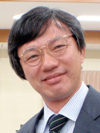February 10, 2012

Assoc. Prof. Tada
A research group including Kyoto University researchers demonstrates that mouse iPS cells, in which genetic correction occurs spontaneously through mitotic recombination, is selectable from the population of genetically mutated iPS cells in the mouse model of autosomal dominant polycystic kidney disease (ADPKD). This technology could be applicable of genome editing in human iPS cells for curing patients with genetic disorders.
This paper was issued to PLoS ONE at 14:00 (PST) on February 9 2012.
Induced pluripotent stem cells (iPSCs) generated by epigenetic reprogramming of personal somatic cells have limited therapeutic capacity for patients suffering from genetic disorders. Here we demonstrate restoration of a genomic mutation heterozygous for Pkd1 (polycystic kidney disease 1) deletion (Pkd1(+/-) to Pkd1(+/R+)) by spontaneous mitotic recombination. Notably, recombination between homologous chromosomes occurred at a frequency of 1-2 per 10,000 iPSCs. Southern blot hybridization and genomic PCR analyses demonstrated that the genotype of the mutation-restored iPSCs was indistinguishable from that of the wild-type cells. Importantly, the frequency of cyst generation in kidneys of adult chimeric mice containing Pkd1(+/R+) iPSCs was significantly lower than that of adult chimeric mice with parental Pkd1(+/-) iPSCs, and indistinguishable from that of wild-type mice. This repair step could be directly incorporated into iPSC development programmes prior to cell transplantation, offering an invaluable step forward for patients carrying a wide range of genetic disorders.
Link to the journal paper:
http://dx.doi.org/10.1371/journal.pone.0032018
http://hdl.handle.net/2433/152547 (Research Information Repository KURENAI)
Cure of ADPKD by selection for spontaneous genetic repair events in Pkd1-mutated iPS cells
Li-Tao Cheng*1, Shogo Nagata*1, Kunio Hirano*1, Shinpei Yamaguchi*1, Shigeo Horie*2, Justin Ainscough*3, Takashi Tada*1
*1 Stem Cell Engineering, Institute for Frontier Medical Scinences, Kyoto University, JAPAN, *2 Urology, Teikyo University, JAPAN, *3 Cardiovascular and Neuronal Remodelling, LIGHT, Leeds University, UK
PLoS ONE 7(2): e32018. doi:10.1371/journal.pone.0032018

